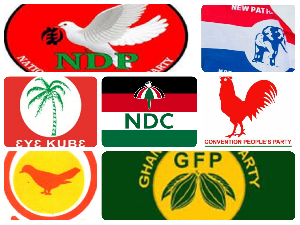 Some political parties in Ghana
Some political parties in Ghana
For lack of knowledge, my people perish (Hosea 4:6), the Holy Bible declares. Similarly, King Jehosaphat reassured his people, "Believe in Jehovah your God, so shall ye be established; believe his prophets, so shall ye prosper" (2 Chronicles 20:20).
In Ghana's 2024 elections, political brands like the National Democratic Congress (NDC) and New Patriotic Party (NPP) seemingly took these lessons to heart, strategically aligning themselves with prophets and leveraging prophecies in their branding practices.
Indeed, some prophets have become intrinsically linked to particular political brands. This provides those brands with significant awareness and cultivates powerful "Brand Ambassadorial" partnerships. Given these prophets' substantial followings, prophecies favoring either the NDC or NPP often lead church members to follow suit and vote accordingly.
This dynamic was evident when then-Vice President Dr. Bawumia visited Prophet Adom Kyei Duah shortly after H.E. John Mahama (then in opposition) paid a courtesy call at the prophet's church. Both sought divine favor and, perhaps more strategically, to expose their brands to the prophet's large congregation during the crucial 2024 election cycle.
Effective political branding hinges on reaching the masses, engaging key influencers, and projecting a charismatic leader with a significant following. Prophets, as representatives of God through whom He speaks and directs, naturally fill this role.
Political brands increasingly weave prophecies into their branding strategies, particularly through social media engagement, to outmaneuver opponents and garner voter acceptance.
The use of prophecies can be seen as a form of political brand endorsement akin to celebrity endorsements. Consider Nana Ama McBrown – a celebrity who endorses multiple brands in Ghana.
Her high social status and massive following translate into an appeal for the endorsed brands among her fans and followers. Similarly, political brands capitalize on prophets and their prophecies to attract larger audiences. This may partly explain the NDC's success in attracting votes from certain congregations.
The shift in the allegiance of Prophet Owusu Bempah – once a staunch supporter of the NPP – from Dr. Bawumia to H.E. John Mahama (reportedly based on divine mandate) undoubtedly had a significant impact on the 2024 election outcome. A similar fate befell King Saul when God's spirit departed from him, and Prophet Samuel was tasked with anointing David as the next King of Israel (1 Samuel 16).
Therefore, political brands seeking to regain or retain power should strategically embrace prophecies from renowned prophets to further boost brand awareness, attract voters from opposing parties, solidify their base, and expand their voter base. Political branding is no longer limited to colors and emblems; prophets, wielding divine authority, can evoke profound "brand resonance" – the highest level of voter affinity and loyalty.
So, should political brands engage in prophecies? History provides some precedent.
Judges 13 recounts that the birth of Samson, a significant figure in the Bible, was revealed by an Angel of the Lord to his mother, outlining God's purpose for him to lead and liberate the Israelites from the Philistines.
Similarly, 1 Samuel 8 details how, when the Israelites requested a King, Prophet Samuel inquired of the Lord, who revealed the characteristics and demands of the King. The people accepted this divinely-guided framework. Even in the New Testament, after Judas Iscariot's death, the Apostles prayed to God and cast lots to elect Matthias against Barnabbas.